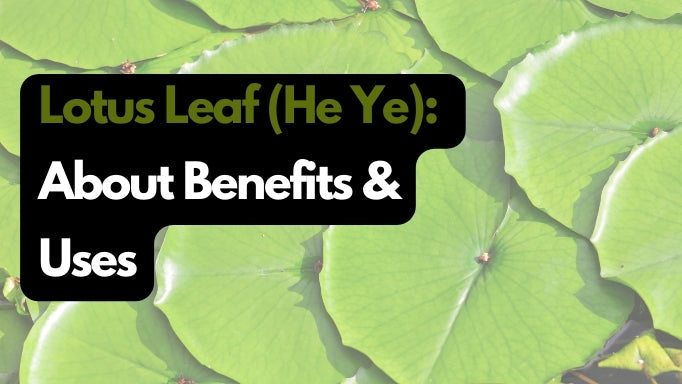
At Vita Herbal Nutrition, we cherish the remarkable potential benefits of nature’s offerings, and dried lotus leaf is a prime example of a natural remedy with a multitude of potential health benefits. Known as He Ye in traditional Chinese medicine, dried lotus leaf has been used for centuries to potentially promote health and wellness. In this blog, we will delve into the potential benefits and uses of Dried Lotus Leaf, highlighting why it may just be an essential addition to your herbal supplement collection.
What is Lotus Leaf (He Ye)?
Lotus Leaf comes from the Lotus plant (Nelumbo nucifera), a symbol of purity and enlightenment in many cultures. While the beautiful flowers often capture attention, the leaves themselves are a powerhouse of potential health benefits. Traditionally used in Chinese, Ayurvedic, and other holistic and herbal medicine systems, lotus leaf has a long history of promoting wellness.

Potential Health Benefits of Lotus Leaf
Weight Management
Dried Lotus Leaf is often praised for its potential role in weight management. It potentially contains compounds that may help regulate lipid metabolism, which could aid in the reduction of body fat. Research indicates that Dried Lotus Leaf could inhibit the absorption of fats and carbohydrates, making it a popular ingredient in weight loss products and supplements.
Cardiovascular Health
He Ye is potentially beneficial for heart health. The flavonoids (a group of natural compounds found in plants, known for their potential antioxidant properties, anti-inflammatory and heart-protective effects, and their role in giving fruits and vegetables their colour) present in Lotus Leaf, potentially help reduce bad cholesterol levels and improve blood circulation. The potential antioxidant properties potentially protect the heart from oxidative stress and inflammation.
Detoxification
Detoxifying the body is another notable potential benefit of Lotus Leaf. It supports liver function and may help in flushing out toxins, thereby possibly promoting overall health. The diuretic properties of lotus leaf also could aid in cleansing the kidneys and bladder.
Anti-Inflammatory and Antioxidant Properties
The anti-inflammatory and antioxidant properties of lotus leaf are well documented. These properties may help combat inflammation and oxidative stress, which are potentially linked to chronic diseases and aging. Regular intake of lotus leaf could contribute to long-term health and vitality.
Digestive Health
Lotus Leaf is also known for its potential positive impact on digestive health. It could help alleviate symptoms of diarrhoea and gastrointestinal discomfort. Its natural compounds may soothe the digestive tract and promote regular bowel movements.
How to Use Lotus Leaf
1. Tea
One of the most common ways to consume Lotus Leaf is in the form of tea. Simply steep dried lotus leaves in hot water for about 10-15 minutes. This herbal tea can be enjoyed hot or cold and offers a refreshing way to potentially benefit from its properties.

2. Cooking
In some cultures, lotus leaves are used in cooking. They can be used to wrap foods, adding a subtle flavour and infusing dishes with their beneficial properties. Popular in Asian cuisines, lotus leaf dishes are not only delicious but also nutritious.

3. Bath Soaks
Adding dried lotus leaf to your bath could create a soothing and detoxifying experience. The potential anti-inflammatory properties may help relieve skin irritation and provide a relaxing, spa-like experience at home. Place into a muslin bag and leave to run under the hot water before soaking in the bath. Add Epsom bath salts for that extra relaxation and to potentially soothe aching muscles.

4. Face Mask
To enhance skin health, dried lotus leaf could be used as a face mask to hydrate and rejuvenate the skin. Crush dried lotus leaf into a powder, add some honey and yoghurt, mix into a smooth paste, and apply it to your face for 15-20 minutes before rinsing off.


Shop Vita Herbal Nutrition's Dried Lotus Leaf
Summary
Lotus Leaf (He Ye) is a versatile and potent herbal ingredient with a wealth of potential health benefits. From potentially aiding in weight management and possibly promoting cardiovascular health to potentially supporting detoxification and digestive wellness, He Ye is a valuable addition to any wellness routine. At Vita Herbal Nutrition, we’re committed to harnessing the power of nature to enhance your health, and lotus leaf is a shining example of nature’s bounty.
Incorporate lotus leaf into your daily routine and experience the potential holistic benefits of this ancient herbal remedy. Stay tuned to our blog for more insights into the world of herbal nutrition!
